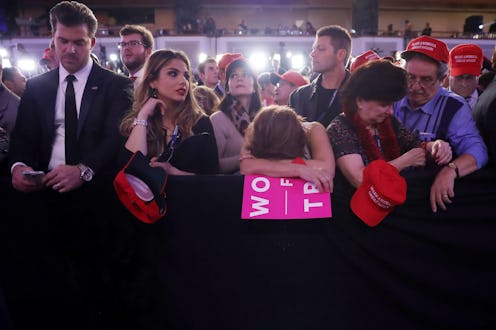News
'WhiteLash' Perfectly Explains A Trump Victory
Our national nightmare isn't over. Not even close. The election may be wrapping up but the culmination of an angry white electorate will have ripple effects for years to come compounded by a Donald Trump victory. Those who were in favor of Trump cited desires to shake up the establishment with an outsider candidate they claimed would overhaul the system completely. Looking toward Trump's rhetoric points to a White backlash, or "whitelash" — a term that has gained traction since Van Jones' impassioned speech about Trump's election night success and turned into a hashtag. #WhiteLash perfectly explains a Trump victory and why that's so scary for underserved communities.
During CNN's live covered of the election on Tuesday night, Jones got real about the current political climate as it relates to race. Jones said:
This was a whitelash, a whitelash against a changing country, it was a whitelash against a Black president in part, and that's the part where the pain comes. And Donald Trump has a responsibility tonight to come out and reassure people that he is going to be the president of all the people he insulted and he offended and brushed aside. Yeah, when you say that you want to take your country back, you've got a lot of people who feel that we're not represented well, either. But we don't want to feel that someone has been elected by throwing away some of us to appeal more deeply to others. So this is a deeply painful moment tonight.
The #WhiteLash hashtag certainly reflects the way that the country's been divided. A quick perusal of tweets reveals pro-Trump messages criticizing those who've shared the Jones speech, citing reverse racism, and openly disparaging minorities. Once tactics typical of the alt-right, the tweets take on a more sinister tone based off the overall breakdown of the way the country has voted. This isn't just some type of anomaly legitimized by media coverage; it's a now generally accepted attitude and viewpoint that many Americans hold.
Those who feel that the #WhiteLash speech more deeply resonates with them have praised Jones and attempted to vault the hashtag towards trending to no avail. Van Jones' name has shown up on Twitter's worldwide and national trends yet #WhiteLash has yet to make it there. Still, the messages are powerful and their points are clear: race relations in the United States is seriously damaged and it's doubtful that Trump will be anything but the bigot he's always said he was.
Perhaps the most evocative portion of Jones' speech is the way that Trump affects the youth of the country. How do you break it to a child that the man who went about his campaign the exact opposite way that child is supposed to act has been rewarded for it? "It's hard to be a parent tonight for a lot of us," Jones said. He continued:
You tell your kids, 'don't be a bully.' You tell your kids, 'don't be a bigot.' You tell your kids, 'do your homework and be prepared.' And then you have this outcome and you have people putting children to bed tonight and they're afraid of breakfast. They're afraid of, 'how do I explain this to my children?' I have Muslim friends who are texting me tonight saying, 'should I leave the country?' I have families of immigrants that are terrified tonight.
It's going to be tough to wake up tomorrow and to trudge forward. Jones' truth is something that simply cannot go ignored, however. To truly combat #WhiteLash, difficult conversations like this need to continue well beyond a hashtag, trending or not.
